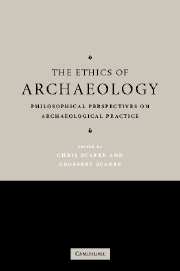Book contents
- Frontmatter
- Contents
- List of contributors
- Acknowledgements
- 1 Introduction
- PART I THE OWNERSHIP OF CULTURAL OBJECTS
- PART II ARCHAEOLOGISTS AND THE LIVING
- PART III ARCHAEOLOGISTS AND THE DEAD
- PART IV THE COMMON HERITAGE OF HUMANKIND?
- 13 A plea for responsibility towards the common heritage of mankind
- 14 The ethics of the World Heritage concept
- 15 What value a unicorn's horn? A study of archaeological uniqueness and value
- References
- Index
13 - A plea for responsibility towards the common heritage of mankind
Published online by Cambridge University Press: 05 June 2012
- Frontmatter
- Contents
- List of contributors
- Acknowledgements
- 1 Introduction
- PART I THE OWNERSHIP OF CULTURAL OBJECTS
- PART II ARCHAEOLOGISTS AND THE LIVING
- PART III ARCHAEOLOGISTS AND THE DEAD
- PART IV THE COMMON HERITAGE OF HUMANKIND?
- 13 A plea for responsibility towards the common heritage of mankind
- 14 The ethics of the World Heritage concept
- 15 What value a unicorn's horn? A study of archaeological uniqueness and value
- References
- Index
Summary
Is technological reproduction the way forward for archaeological sites and remains in the future? During past years a number of sites have been, wholly or in part, closed for public viewing, because of the impact that factors such as weather and mass tourism have had on them. However it is not difficult to envisage a scenario in twenty years' time when the only way in which the general public could learn more about archaeological heritage would be either through glass cases in museums or by means of virtual reality trips to the sites.
Is this the way that archaeological sites and artefacts will be made available to the public in the future, as a series of ‘experiences’, where one's location is irrelevant to the location of the site being ‘experienced’ and where the negative impact of mass tourism on sites will be diminished or totally eliminated? Or do we prefer another – cleaner but perhaps more ‘authentic’ – version of present-day reality, a ‘see but don't touch’ version where what ‘we’ say is what ‘you’ must believe and where the public is transported through ‘time-carts’ and regaled with a univocal version of times past?
- Type
- Chapter
- Information
- The Ethics of ArchaeologyPhilosophical Perspectives on Archaeological Practice, pp. 219 - 241Publisher: Cambridge University PressPrint publication year: 2006
- 5
- Cited by



